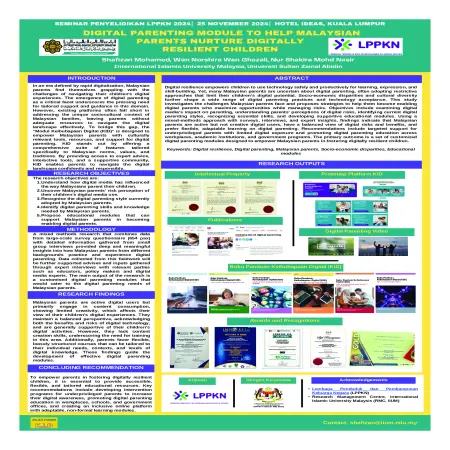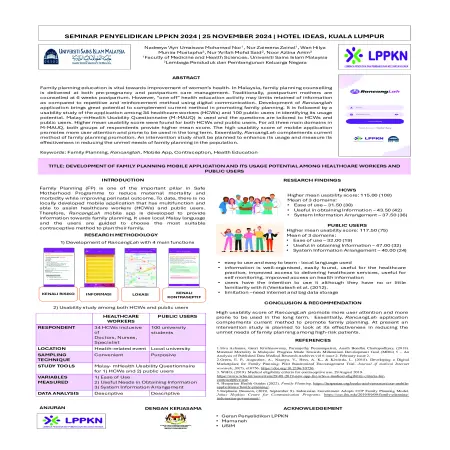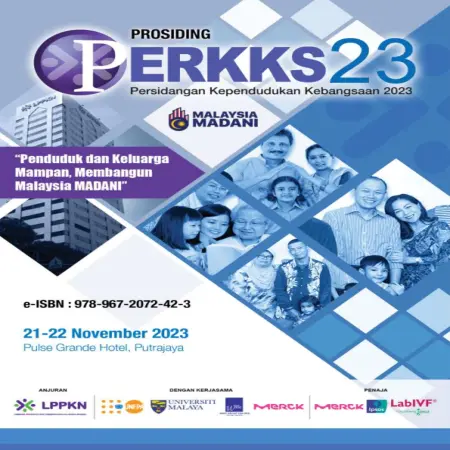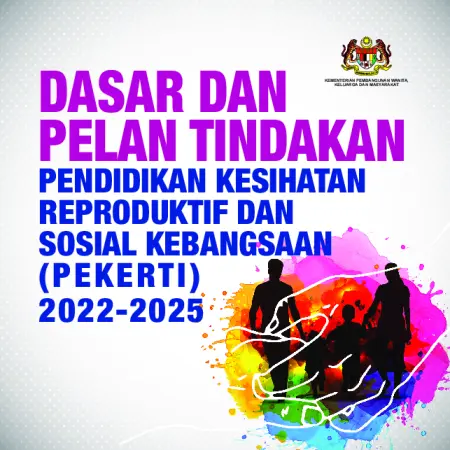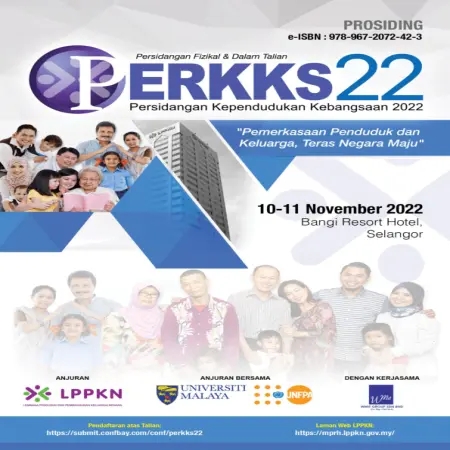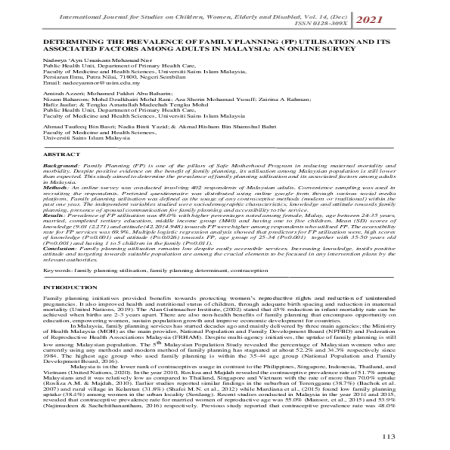PUBLICATIONS
|
|
Dapatan data subfertitli Kebangsaan bagi tahun 2023
Item Type: Infographic
Editor:
Year: 00/12/2024
Abstract: The collection of subfertility data involves all registered hospitals and clinics providing subfertility treatment services throughout Malaysia from January 1, 2023, to December 31, 2023. The collected subfertility data has been approved by NPFDB (LPPKN), including information on the profiles of new female and male clients (husbands) in the current year, as well as details of subfertility treatments carried out at the participating facilities during the same period.
|
|
|
|
|
|
Digital parenting module to help Malaysian parents nurture digitally resilient children
Item Type: Scientific Poster
Editor:
Year: 00/11/2024
Abstract: Digital resilience empowers children to use technology safely and productively for learning, expression, and skill-building. Yet, many Malaysian parents are uncertain about digital parenting, often adopting restrictive approaches that limit their children’s digital potential. Socio-economic disparities and cultural diversity further shape a wide range of digital parenting practices and technology acceptance. This study investigates the challenges Malaysian parents face and proposes strategies to help them become enabling digital parents who maximize opportunities while managing risks. Objectives include examining digital media’s impact on parenting, understanding parents' perceptions of digital risks, identifying current digital parenting styles, recognizing essential skills, and developing supportive educational modules. Using a mixed-methods approach with surveys, interviews, and expert insights, findings indicate that Malaysian parents are active but not creative digital users, have a balanced view of digital risks and benefits, and prefer flexible, adaptable learning on digital parenting. Recommendations include targeted support for underprivileged parents with limited digital exposure and promoting digital parenting education across workplaces, academic institutions, and government programs. The primary outcome is a set of customized digital parenting modules designed to empower Malaysian parents in fostering digitally resilient children.
|
|
|
|
|
|
Development of family planning mobile application and its usage potential among healthcare workers and public users
Item Type: Scientific Poster
Editor:
Year: 00/11/2024
Abstract: Family planning education is vital towards improvement of women’s health. In Malaysia, family planning counselling is delivered at both pre-pregnancy and postpartum care management. Traditionally, postpartum mothers are counselled at 6 weeks postpartum. However, “one off” health education activity may limits retained of information as compared to repetitive and reinforcement method using digital communication. Development of Rancanglah application brings great potential to complement current method in promoting family planning. It is followed by a usability study of the application among 34 healthcare workers (HCWs) and 100 public users in identifying its usage potential. Malay-mHealth Usability Questionnaire (M-MAUQ) is used and the questions are tailored to HCWs and public users. Higher mean usability score were found for both HCWs and public users. For all three main domains in M-MAUQ, both groups of respondents provide higher mean score. The high usability score of mobile application promotes more user attention and prone to be used in the long term. Essentially, RancangLah complements current method of family planning promotion. An intervention study shall be planned to enhance its usage and measure its effectiveness in reducing the unmet needs of family planning in the population.
|
|
|
|
|
|
Descriptive analysis : family planning method in Klinik Nur Sejahtera (National Population and Family Development Board Malaysia) in the year 2018 – 2022
Item Type: Book Section
Editor:
Year: 00/12/2023
Abstract: Family planning (FP) is a component of sexual and reproductive health (SRH) and refers to the human right of individuals to regulate the number and spacing of birth. In Malaysia, contraceptive prevalence rate (CPR) during the past three decades has remained stagnant, with only 34-35% of women practicing modern contraception, this number relatively low compared to global rate and neighboring countries (Najimudeen, 2014).
|
|
|
|
|
|
Descriptive analysis: family planning method in Klinik Nur Sejahtera ( National Population and Family Development Board Malaysia) in the year 2018-2022
Item Type: Scientific Poster
Editor:
Year: 00/11/2023
Abstract: Family Planning (FP) is a component of sexual and reproductive health (SRH) and refers to the human right of individuals to regulate the number and spacing of birth. In Malaysia, contraceptive prevalence rate (CPR) during the past three decades has remained stagnant, with only 34-35% of women practicing modern contraception, this number relatively low compared to global rate and neighboring countries. It has 49 clinics (Klinik Nur Sejahtera) located all around Malaysia whose services focus in Women’s Health particularly in family planning and reproductive cancer screening.
|
|
|
|
|
|
Dasar dan Pelan Tindakan Pendidikan Kesihatan Reproduktif dan Sosial Kebangsaan (PEKERTI) 2022-2025
Item Type: Act & Policy
Editor:
Year: 08/09/2022
Abstract: This new PEKERTI policy is applicable to every individual regardless of age and gender and takes into account ethnic, religious and cultural diversity. Focus will be given to producing a healthy population in terms of reproductive and sexual health based on high moral values and practicing responsible behavior and mutual respect for each other.
This PEKERTI policy has been streamlined to achieve 5 objectives which are to (i) increase the awareness of Malaysians regarding the importance of reproductive and social health education, (ii) develop evidence-based reproductive and social health education programs, (iii) develop human expertise and modernity in aspects reproductive and social health education, (iv) carry out research in aspects of reproductive and social health education and (v) ensure programs and services under this policy are continuously monitored and evaluated.
In order to achieve these 5 objectives that have been set, 5 Cores have been identified as policy implementation machinery namely (i) Advocacy, Promotion and Prevention, (ii) Comprehensive Reproductive and Social Health Education Covering All Age Levels, (iii) Human Capital and other Resources for Reproductive and Social Health education, (iv) Research and Development and (v) Monitoring and Evaluation.
|
|
|
|
|
|
Daya tahan keluarga muda di Malaysia: penemuan kajian indeks kesejahteraan keluarga Malaysia 2019
Item Type: Book Section
Editor:
Year: 00/00/2022
Abstract: Every year, the number of divorce cases in the country is increasing, especially among young couples. Lack of understanding, narrowness of life and interference from outside parties are among the main factors in the occurance of household rifts at this time. In the face of challenges and crises related to family institutions, the element of family resilience needs to be strengthened.
|
|
|
|
|
|
Development of a high-energy nutrient-dense meal as supplementary functional food for improving problem of stunted and under-nourished children
Item Type: Article
Editor:
Year: 00/12/2021
Abstract: Poverty, obesity and lifestyles are the most associated factors of vitamin D deficiency among urban-living children in Malaysia. Vitamin D is necessary for calcium absorption from food to ensure healthy bones and teeth. Vitamin D deficiency can cause soft and brittle bones disease known as rickets in children and osteomalacia in adults. Based on previous research, lack of nutritional knowledge among parents can contribute to nutrition deficiencies in children. To overcome this issue, nutritional education and awareness campaign among parents are needed. Besides campaign, the development of supplementary functional food which can provide crucial nutrients and energy that can assist in brain and body growth seems beneficial.
|
|
|
|
|
|
Determining the prevalence of family planning (FP) utilisation and its associated factors among adults in Malaysia: an online survey
Item Type: Article
Editor:
Year: 00/12/2021
Abstract: Family Planning (FP) is one of the pillars of Safe Motherhood Program in reducing maternal mortality and morbidity. Despite positive evidence on the benefit of family planning, its utilisation among Malaysian population is still lower than expected. This study aimed to determine the prevalence of family planning utilisation and its associated factors among adults in Malaysia.
|
|
|
|






